SBM3204: Ethics in Business Decision Making - An IKEA Case Analysis
VerifiedAdded on 2023/04/21
|11
|2857
|431
Report
AI Summary
This report critically reviews the role of ethics in business decisions, using IKEA as a case study to understand how large international companies integrate ethical considerations into their practices. It explores the relevance of ethics for business decisions, examining IKEA's policies and actions, including their supplier code of conduct (IWAY) and employee surveys (VOICE). The report also addresses the importance of ethics for small businesses, highlighting the potential impact on firm value, growth, and reputation in a globalized world, and concludes that ethical behavior is crucial for sustainable growth and competitive advantage in both large and small enterprises. This assignment is available on Desklib, where students can find past papers and solved assignments for their studies.
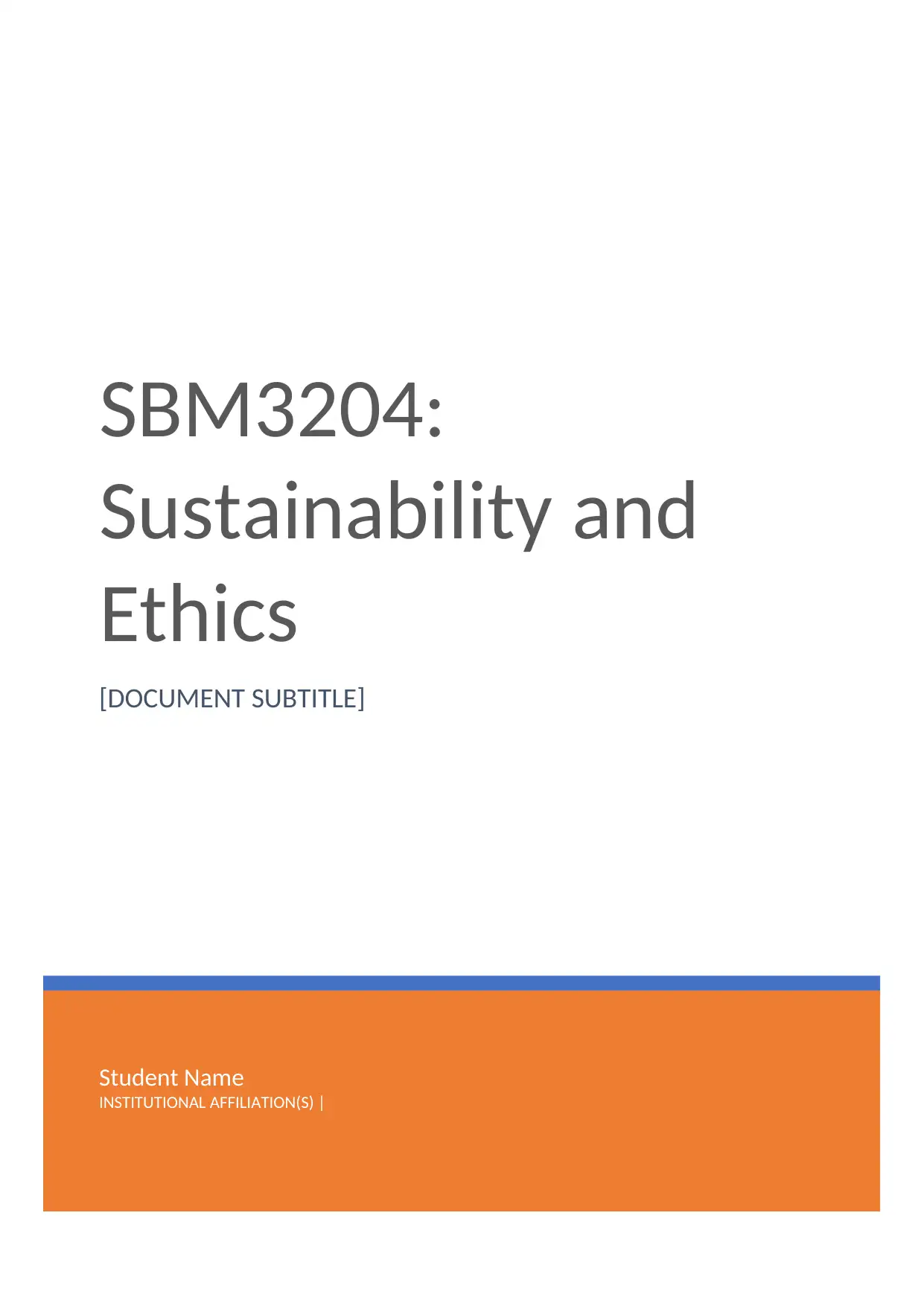
Student Name
INSTITUTIONAL AFFILIATION(S) |
SBM3204:
Sustainability and
Ethics
[DOCUMENT SUBTITLE]
INSTITUTIONAL AFFILIATION(S) |
SBM3204:
Sustainability and
Ethics
[DOCUMENT SUBTITLE]
Paraphrase This Document
Need a fresh take? Get an instant paraphrase of this document with our AI Paraphraser
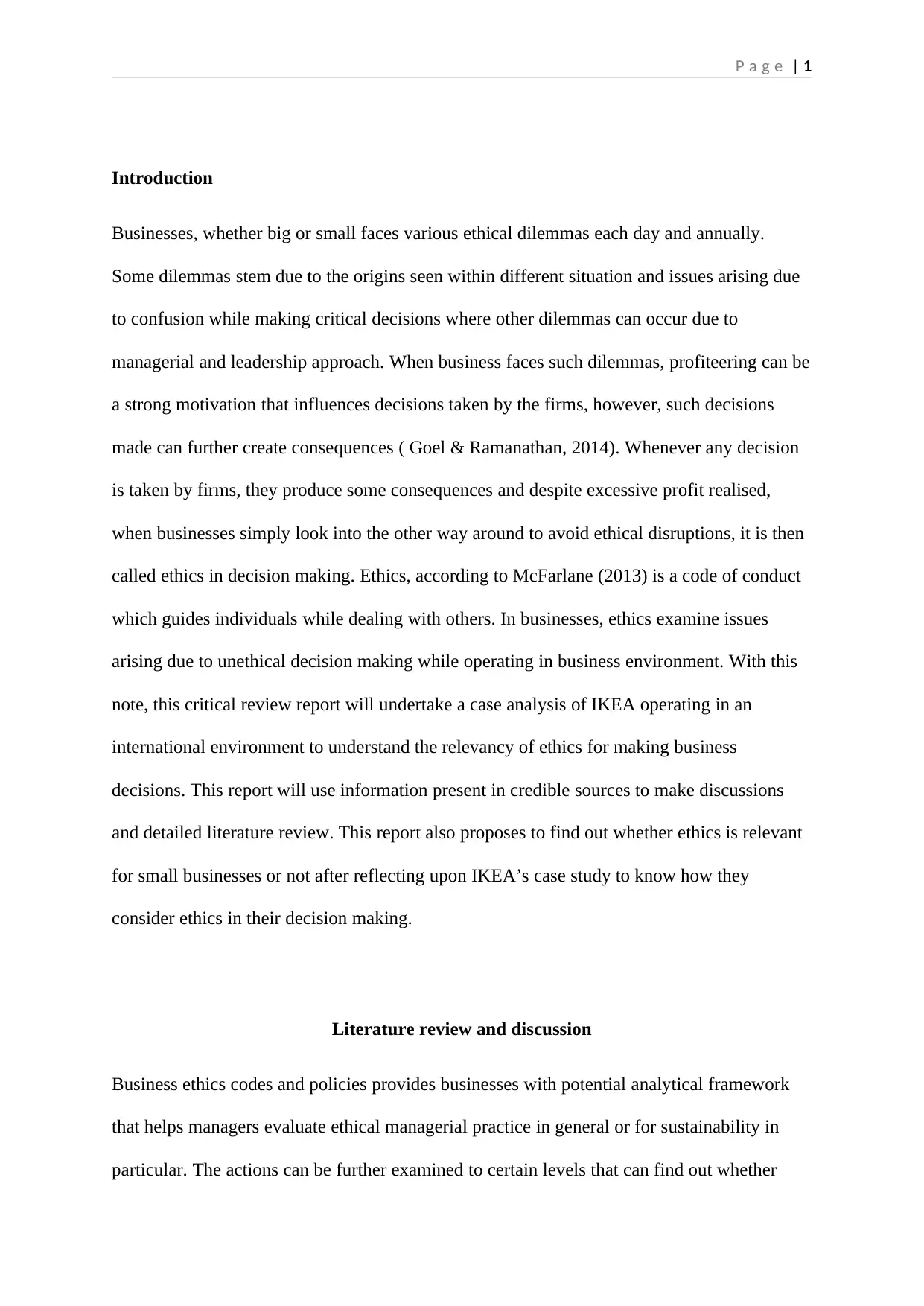
P a g e | 1
Introduction
Businesses, whether big or small faces various ethical dilemmas each day and annually.
Some dilemmas stem due to the origins seen within different situation and issues arising due
to confusion while making critical decisions where other dilemmas can occur due to
managerial and leadership approach. When business faces such dilemmas, profiteering can be
a strong motivation that influences decisions taken by the firms, however, such decisions
made can further create consequences ( Goel & Ramanathan, 2014). Whenever any decision
is taken by firms, they produce some consequences and despite excessive profit realised,
when businesses simply look into the other way around to avoid ethical disruptions, it is then
called ethics in decision making. Ethics, according to McFarlane (2013) is a code of conduct
which guides individuals while dealing with others. In businesses, ethics examine issues
arising due to unethical decision making while operating in business environment. With this
note, this critical review report will undertake a case analysis of IKEA operating in an
international environment to understand the relevancy of ethics for making business
decisions. This report will use information present in credible sources to make discussions
and detailed literature review. This report also proposes to find out whether ethics is relevant
for small businesses or not after reflecting upon IKEA’s case study to know how they
consider ethics in their decision making.
Literature review and discussion
Business ethics codes and policies provides businesses with potential analytical framework
that helps managers evaluate ethical managerial practice in general or for sustainability in
particular. The actions can be further examined to certain levels that can find out whether
Introduction
Businesses, whether big or small faces various ethical dilemmas each day and annually.
Some dilemmas stem due to the origins seen within different situation and issues arising due
to confusion while making critical decisions where other dilemmas can occur due to
managerial and leadership approach. When business faces such dilemmas, profiteering can be
a strong motivation that influences decisions taken by the firms, however, such decisions
made can further create consequences ( Goel & Ramanathan, 2014). Whenever any decision
is taken by firms, they produce some consequences and despite excessive profit realised,
when businesses simply look into the other way around to avoid ethical disruptions, it is then
called ethics in decision making. Ethics, according to McFarlane (2013) is a code of conduct
which guides individuals while dealing with others. In businesses, ethics examine issues
arising due to unethical decision making while operating in business environment. With this
note, this critical review report will undertake a case analysis of IKEA operating in an
international environment to understand the relevancy of ethics for making business
decisions. This report will use information present in credible sources to make discussions
and detailed literature review. This report also proposes to find out whether ethics is relevant
for small businesses or not after reflecting upon IKEA’s case study to know how they
consider ethics in their decision making.
Literature review and discussion
Business ethics codes and policies provides businesses with potential analytical framework
that helps managers evaluate ethical managerial practice in general or for sustainability in
particular. The actions can be further examined to certain levels that can find out whether
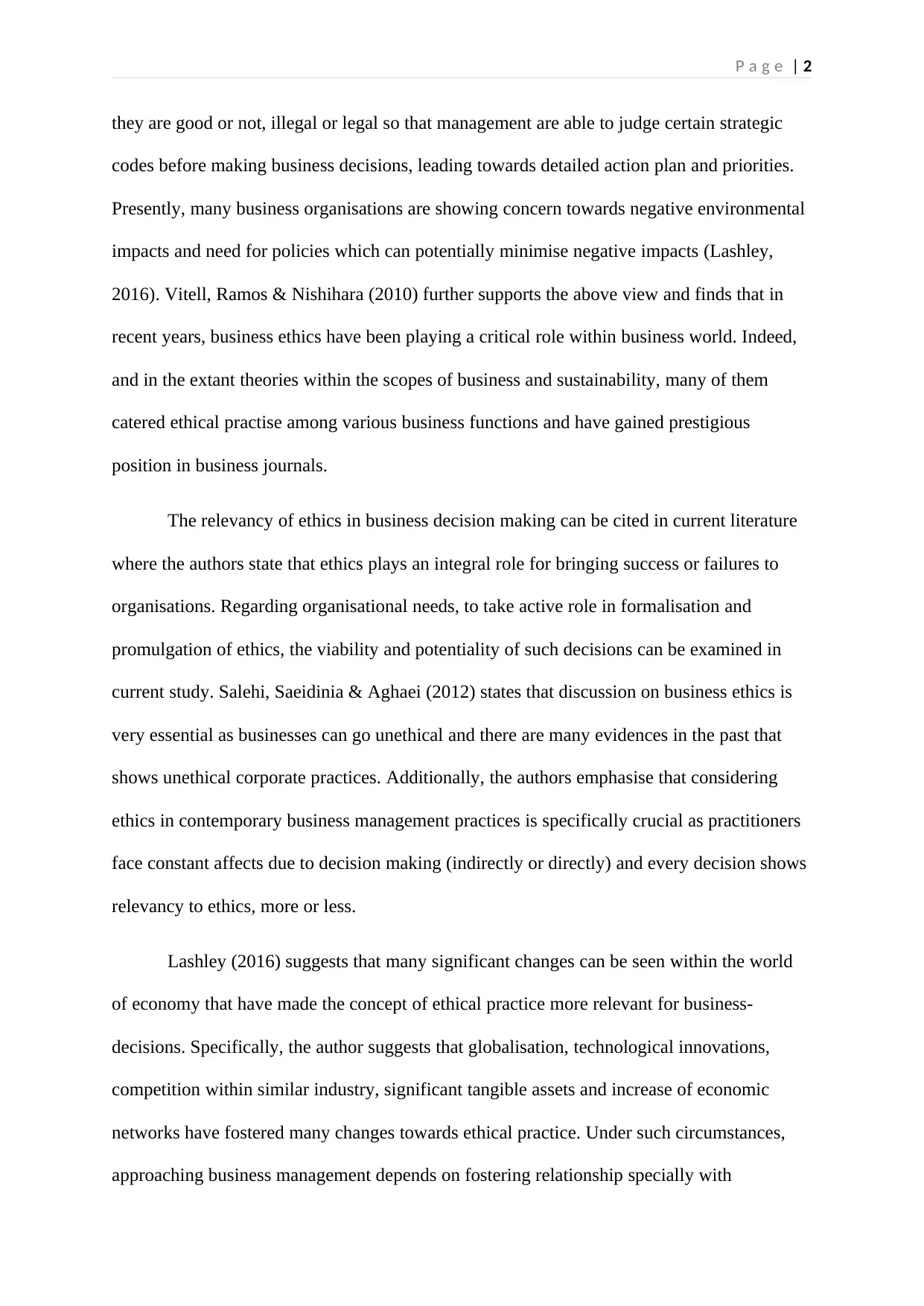
P a g e | 2
they are good or not, illegal or legal so that management are able to judge certain strategic
codes before making business decisions, leading towards detailed action plan and priorities.
Presently, many business organisations are showing concern towards negative environmental
impacts and need for policies which can potentially minimise negative impacts (Lashley,
2016). Vitell, Ramos & Nishihara (2010) further supports the above view and finds that in
recent years, business ethics have been playing a critical role within business world. Indeed,
and in the extant theories within the scopes of business and sustainability, many of them
catered ethical practise among various business functions and have gained prestigious
position in business journals.
The relevancy of ethics in business decision making can be cited in current literature
where the authors state that ethics plays an integral role for bringing success or failures to
organisations. Regarding organisational needs, to take active role in formalisation and
promulgation of ethics, the viability and potentiality of such decisions can be examined in
current study. Salehi, Saeidinia & Aghaei (2012) states that discussion on business ethics is
very essential as businesses can go unethical and there are many evidences in the past that
shows unethical corporate practices. Additionally, the authors emphasise that considering
ethics in contemporary business management practices is specifically crucial as practitioners
face constant affects due to decision making (indirectly or directly) and every decision shows
relevancy to ethics, more or less.
Lashley (2016) suggests that many significant changes can be seen within the world
of economy that have made the concept of ethical practice more relevant for business-
decisions. Specifically, the author suggests that globalisation, technological innovations,
competition within similar industry, significant tangible assets and increase of economic
networks have fostered many changes towards ethical practice. Under such circumstances,
approaching business management depends on fostering relationship specially with
they are good or not, illegal or legal so that management are able to judge certain strategic
codes before making business decisions, leading towards detailed action plan and priorities.
Presently, many business organisations are showing concern towards negative environmental
impacts and need for policies which can potentially minimise negative impacts (Lashley,
2016). Vitell, Ramos & Nishihara (2010) further supports the above view and finds that in
recent years, business ethics have been playing a critical role within business world. Indeed,
and in the extant theories within the scopes of business and sustainability, many of them
catered ethical practise among various business functions and have gained prestigious
position in business journals.
The relevancy of ethics in business decision making can be cited in current literature
where the authors state that ethics plays an integral role for bringing success or failures to
organisations. Regarding organisational needs, to take active role in formalisation and
promulgation of ethics, the viability and potentiality of such decisions can be examined in
current study. Salehi, Saeidinia & Aghaei (2012) states that discussion on business ethics is
very essential as businesses can go unethical and there are many evidences in the past that
shows unethical corporate practices. Additionally, the authors emphasise that considering
ethics in contemporary business management practices is specifically crucial as practitioners
face constant affects due to decision making (indirectly or directly) and every decision shows
relevancy to ethics, more or less.
Lashley (2016) suggests that many significant changes can be seen within the world
of economy that have made the concept of ethical practice more relevant for business-
decisions. Specifically, the author suggests that globalisation, technological innovations,
competition within similar industry, significant tangible assets and increase of economic
networks have fostered many changes towards ethical practice. Under such circumstances,
approaching business management depends on fostering relationship specially with
⊘ This is a preview!⊘
Do you want full access?
Subscribe today to unlock all pages.

Trusted by 1+ million students worldwide
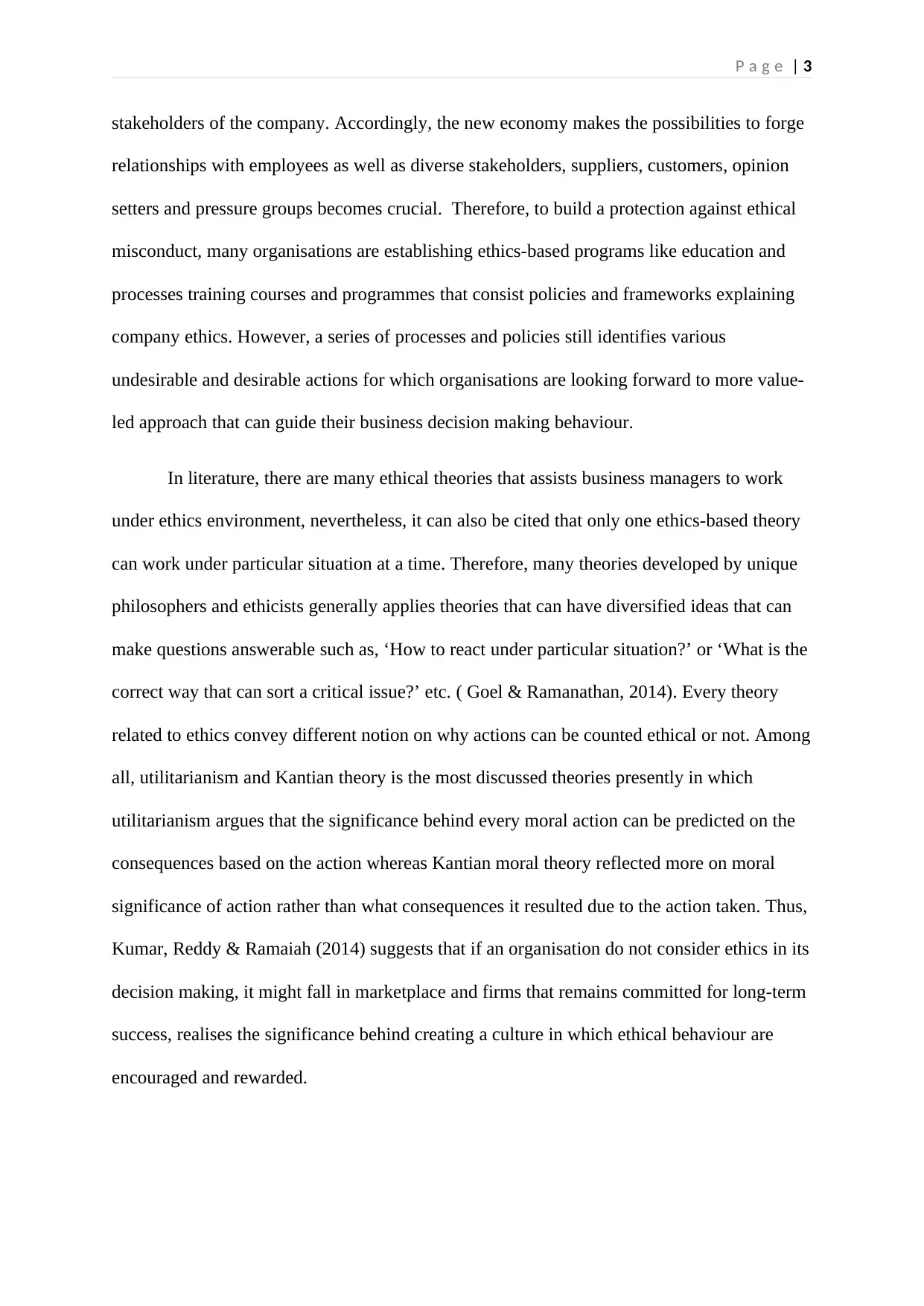
P a g e | 3
stakeholders of the company. Accordingly, the new economy makes the possibilities to forge
relationships with employees as well as diverse stakeholders, suppliers, customers, opinion
setters and pressure groups becomes crucial. Therefore, to build a protection against ethical
misconduct, many organisations are establishing ethics-based programs like education and
processes training courses and programmes that consist policies and frameworks explaining
company ethics. However, a series of processes and policies still identifies various
undesirable and desirable actions for which organisations are looking forward to more value-
led approach that can guide their business decision making behaviour.
In literature, there are many ethical theories that assists business managers to work
under ethics environment, nevertheless, it can also be cited that only one ethics-based theory
can work under particular situation at a time. Therefore, many theories developed by unique
philosophers and ethicists generally applies theories that can have diversified ideas that can
make questions answerable such as, ‘How to react under particular situation?’ or ‘What is the
correct way that can sort a critical issue?’ etc. ( Goel & Ramanathan, 2014). Every theory
related to ethics convey different notion on why actions can be counted ethical or not. Among
all, utilitarianism and Kantian theory is the most discussed theories presently in which
utilitarianism argues that the significance behind every moral action can be predicted on the
consequences based on the action whereas Kantian moral theory reflected more on moral
significance of action rather than what consequences it resulted due to the action taken. Thus,
Kumar, Reddy & Ramaiah (2014) suggests that if an organisation do not consider ethics in its
decision making, it might fall in marketplace and firms that remains committed for long-term
success, realises the significance behind creating a culture in which ethical behaviour are
encouraged and rewarded.
stakeholders of the company. Accordingly, the new economy makes the possibilities to forge
relationships with employees as well as diverse stakeholders, suppliers, customers, opinion
setters and pressure groups becomes crucial. Therefore, to build a protection against ethical
misconduct, many organisations are establishing ethics-based programs like education and
processes training courses and programmes that consist policies and frameworks explaining
company ethics. However, a series of processes and policies still identifies various
undesirable and desirable actions for which organisations are looking forward to more value-
led approach that can guide their business decision making behaviour.
In literature, there are many ethical theories that assists business managers to work
under ethics environment, nevertheless, it can also be cited that only one ethics-based theory
can work under particular situation at a time. Therefore, many theories developed by unique
philosophers and ethicists generally applies theories that can have diversified ideas that can
make questions answerable such as, ‘How to react under particular situation?’ or ‘What is the
correct way that can sort a critical issue?’ etc. ( Goel & Ramanathan, 2014). Every theory
related to ethics convey different notion on why actions can be counted ethical or not. Among
all, utilitarianism and Kantian theory is the most discussed theories presently in which
utilitarianism argues that the significance behind every moral action can be predicted on the
consequences based on the action whereas Kantian moral theory reflected more on moral
significance of action rather than what consequences it resulted due to the action taken. Thus,
Kumar, Reddy & Ramaiah (2014) suggests that if an organisation do not consider ethics in its
decision making, it might fall in marketplace and firms that remains committed for long-term
success, realises the significance behind creating a culture in which ethical behaviour are
encouraged and rewarded.
Paraphrase This Document
Need a fresh take? Get an instant paraphrase of this document with our AI Paraphraser
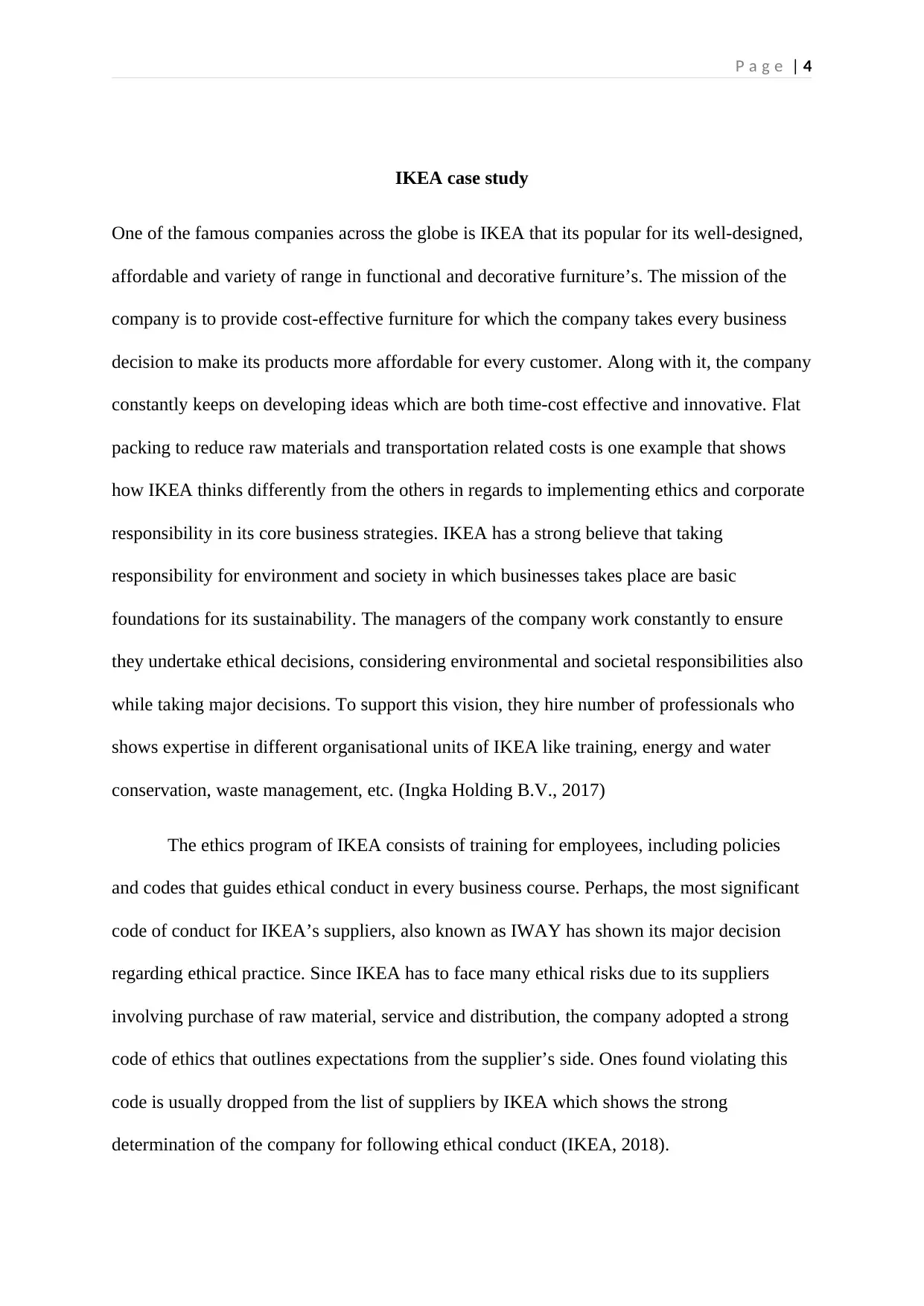
P a g e | 4
IKEA case study
One of the famous companies across the globe is IKEA that its popular for its well-designed,
affordable and variety of range in functional and decorative furniture’s. The mission of the
company is to provide cost-effective furniture for which the company takes every business
decision to make its products more affordable for every customer. Along with it, the company
constantly keeps on developing ideas which are both time-cost effective and innovative. Flat
packing to reduce raw materials and transportation related costs is one example that shows
how IKEA thinks differently from the others in regards to implementing ethics and corporate
responsibility in its core business strategies. IKEA has a strong believe that taking
responsibility for environment and society in which businesses takes place are basic
foundations for its sustainability. The managers of the company work constantly to ensure
they undertake ethical decisions, considering environmental and societal responsibilities also
while taking major decisions. To support this vision, they hire number of professionals who
shows expertise in different organisational units of IKEA like training, energy and water
conservation, waste management, etc. (Ingka Holding B.V., 2017)
The ethics program of IKEA consists of training for employees, including policies
and codes that guides ethical conduct in every business course. Perhaps, the most significant
code of conduct for IKEA’s suppliers, also known as IWAY has shown its major decision
regarding ethical practice. Since IKEA has to face many ethical risks due to its suppliers
involving purchase of raw material, service and distribution, the company adopted a strong
code of ethics that outlines expectations from the supplier’s side. Ones found violating this
code is usually dropped from the list of suppliers by IKEA which shows the strong
determination of the company for following ethical conduct (IKEA, 2018).
IKEA case study
One of the famous companies across the globe is IKEA that its popular for its well-designed,
affordable and variety of range in functional and decorative furniture’s. The mission of the
company is to provide cost-effective furniture for which the company takes every business
decision to make its products more affordable for every customer. Along with it, the company
constantly keeps on developing ideas which are both time-cost effective and innovative. Flat
packing to reduce raw materials and transportation related costs is one example that shows
how IKEA thinks differently from the others in regards to implementing ethics and corporate
responsibility in its core business strategies. IKEA has a strong believe that taking
responsibility for environment and society in which businesses takes place are basic
foundations for its sustainability. The managers of the company work constantly to ensure
they undertake ethical decisions, considering environmental and societal responsibilities also
while taking major decisions. To support this vision, they hire number of professionals who
shows expertise in different organisational units of IKEA like training, energy and water
conservation, waste management, etc. (Ingka Holding B.V., 2017)
The ethics program of IKEA consists of training for employees, including policies
and codes that guides ethical conduct in every business course. Perhaps, the most significant
code of conduct for IKEA’s suppliers, also known as IWAY has shown its major decision
regarding ethical practice. Since IKEA has to face many ethical risks due to its suppliers
involving purchase of raw material, service and distribution, the company adopted a strong
code of ethics that outlines expectations from the supplier’s side. Ones found violating this
code is usually dropped from the list of suppliers by IKEA which shows the strong
determination of the company for following ethical conduct (IKEA, 2018).
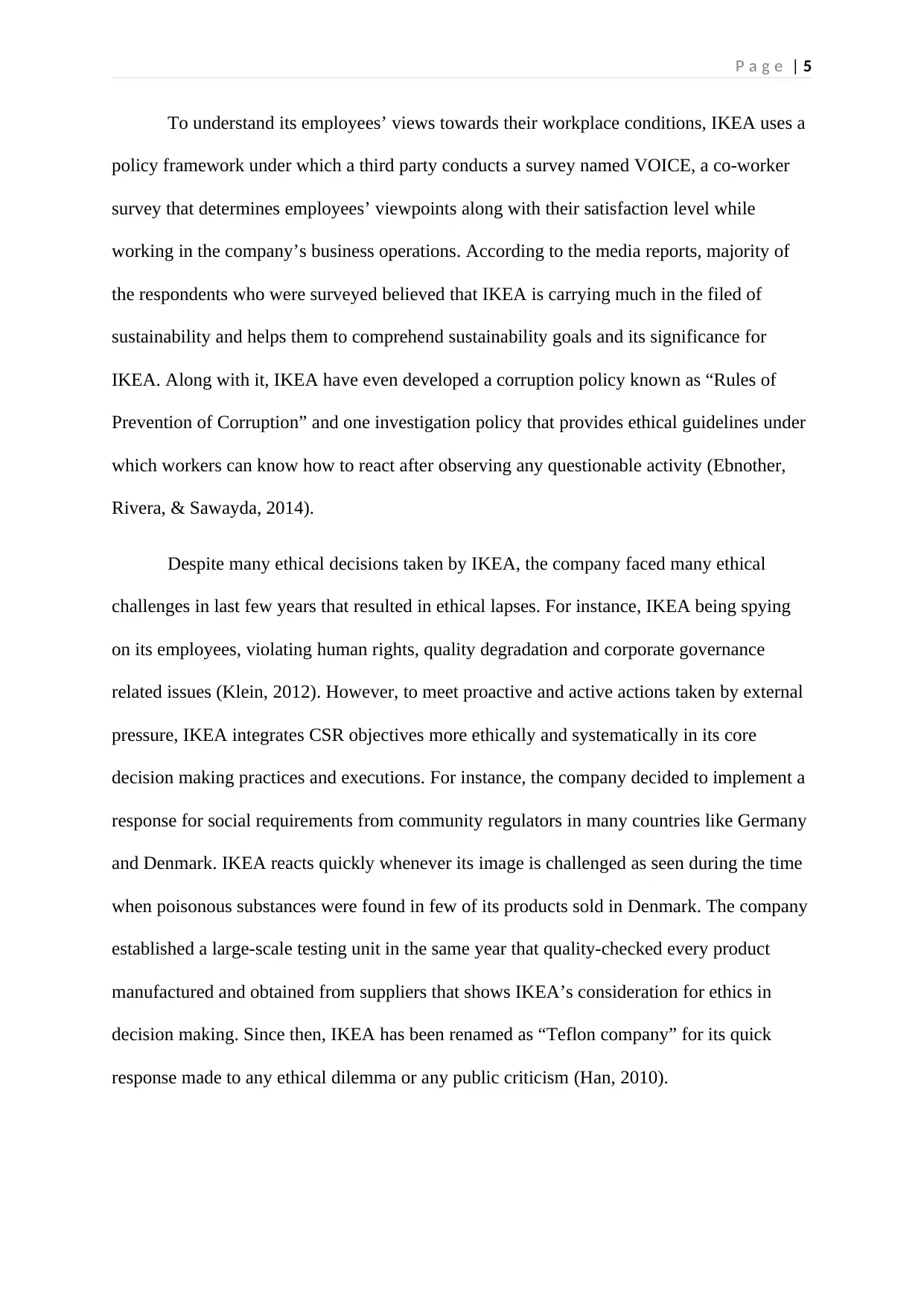
P a g e | 5
To understand its employees’ views towards their workplace conditions, IKEA uses a
policy framework under which a third party conducts a survey named VOICE, a co-worker
survey that determines employees’ viewpoints along with their satisfaction level while
working in the company’s business operations. According to the media reports, majority of
the respondents who were surveyed believed that IKEA is carrying much in the filed of
sustainability and helps them to comprehend sustainability goals and its significance for
IKEA. Along with it, IKEA have even developed a corruption policy known as “Rules of
Prevention of Corruption” and one investigation policy that provides ethical guidelines under
which workers can know how to react after observing any questionable activity (Ebnother,
Rivera, & Sawayda, 2014).
Despite many ethical decisions taken by IKEA, the company faced many ethical
challenges in last few years that resulted in ethical lapses. For instance, IKEA being spying
on its employees, violating human rights, quality degradation and corporate governance
related issues (Klein, 2012). However, to meet proactive and active actions taken by external
pressure, IKEA integrates CSR objectives more ethically and systematically in its core
decision making practices and executions. For instance, the company decided to implement a
response for social requirements from community regulators in many countries like Germany
and Denmark. IKEA reacts quickly whenever its image is challenged as seen during the time
when poisonous substances were found in few of its products sold in Denmark. The company
established a large-scale testing unit in the same year that quality-checked every product
manufactured and obtained from suppliers that shows IKEA’s consideration for ethics in
decision making. Since then, IKEA has been renamed as “Teflon company” for its quick
response made to any ethical dilemma or any public criticism (Han, 2010).
To understand its employees’ views towards their workplace conditions, IKEA uses a
policy framework under which a third party conducts a survey named VOICE, a co-worker
survey that determines employees’ viewpoints along with their satisfaction level while
working in the company’s business operations. According to the media reports, majority of
the respondents who were surveyed believed that IKEA is carrying much in the filed of
sustainability and helps them to comprehend sustainability goals and its significance for
IKEA. Along with it, IKEA have even developed a corruption policy known as “Rules of
Prevention of Corruption” and one investigation policy that provides ethical guidelines under
which workers can know how to react after observing any questionable activity (Ebnother,
Rivera, & Sawayda, 2014).
Despite many ethical decisions taken by IKEA, the company faced many ethical
challenges in last few years that resulted in ethical lapses. For instance, IKEA being spying
on its employees, violating human rights, quality degradation and corporate governance
related issues (Klein, 2012). However, to meet proactive and active actions taken by external
pressure, IKEA integrates CSR objectives more ethically and systematically in its core
decision making practices and executions. For instance, the company decided to implement a
response for social requirements from community regulators in many countries like Germany
and Denmark. IKEA reacts quickly whenever its image is challenged as seen during the time
when poisonous substances were found in few of its products sold in Denmark. The company
established a large-scale testing unit in the same year that quality-checked every product
manufactured and obtained from suppliers that shows IKEA’s consideration for ethics in
decision making. Since then, IKEA has been renamed as “Teflon company” for its quick
response made to any ethical dilemma or any public criticism (Han, 2010).
⊘ This is a preview!⊘
Do you want full access?
Subscribe today to unlock all pages.

Trusted by 1+ million students worldwide
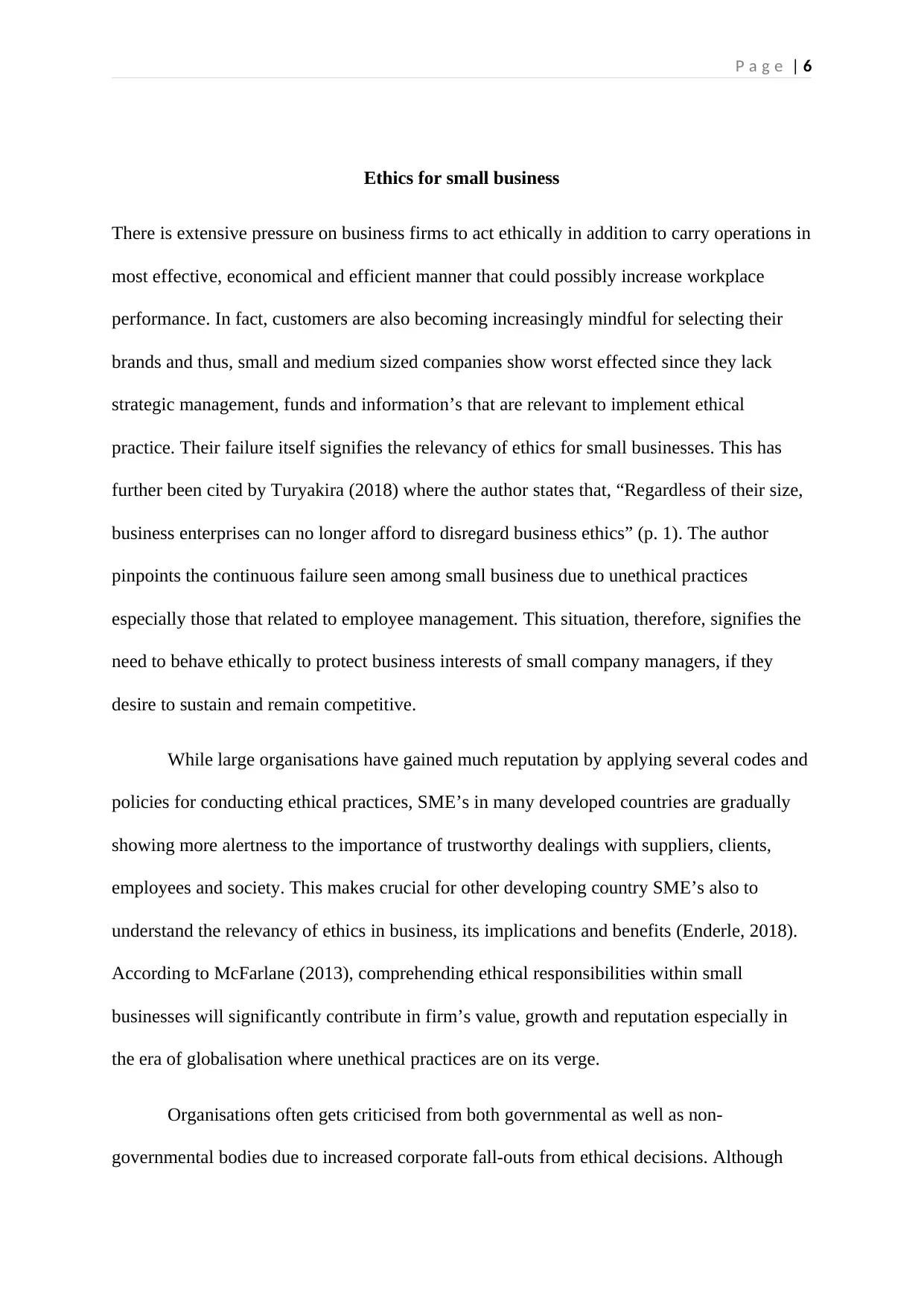
P a g e | 6
Ethics for small business
There is extensive pressure on business firms to act ethically in addition to carry operations in
most effective, economical and efficient manner that could possibly increase workplace
performance. In fact, customers are also becoming increasingly mindful for selecting their
brands and thus, small and medium sized companies show worst effected since they lack
strategic management, funds and information’s that are relevant to implement ethical
practice. Their failure itself signifies the relevancy of ethics for small businesses. This has
further been cited by Turyakira (2018) where the author states that, “Regardless of their size,
business enterprises can no longer afford to disregard business ethics” (p. 1). The author
pinpoints the continuous failure seen among small business due to unethical practices
especially those that related to employee management. This situation, therefore, signifies the
need to behave ethically to protect business interests of small company managers, if they
desire to sustain and remain competitive.
While large organisations have gained much reputation by applying several codes and
policies for conducting ethical practices, SME’s in many developed countries are gradually
showing more alertness to the importance of trustworthy dealings with suppliers, clients,
employees and society. This makes crucial for other developing country SME’s also to
understand the relevancy of ethics in business, its implications and benefits (Enderle, 2018).
According to McFarlane (2013), comprehending ethical responsibilities within small
businesses will significantly contribute in firm’s value, growth and reputation especially in
the era of globalisation where unethical practices are on its verge.
Organisations often gets criticised from both governmental as well as non-
governmental bodies due to increased corporate fall-outs from ethical decisions. Although
Ethics for small business
There is extensive pressure on business firms to act ethically in addition to carry operations in
most effective, economical and efficient manner that could possibly increase workplace
performance. In fact, customers are also becoming increasingly mindful for selecting their
brands and thus, small and medium sized companies show worst effected since they lack
strategic management, funds and information’s that are relevant to implement ethical
practice. Their failure itself signifies the relevancy of ethics for small businesses. This has
further been cited by Turyakira (2018) where the author states that, “Regardless of their size,
business enterprises can no longer afford to disregard business ethics” (p. 1). The author
pinpoints the continuous failure seen among small business due to unethical practices
especially those that related to employee management. This situation, therefore, signifies the
need to behave ethically to protect business interests of small company managers, if they
desire to sustain and remain competitive.
While large organisations have gained much reputation by applying several codes and
policies for conducting ethical practices, SME’s in many developed countries are gradually
showing more alertness to the importance of trustworthy dealings with suppliers, clients,
employees and society. This makes crucial for other developing country SME’s also to
understand the relevancy of ethics in business, its implications and benefits (Enderle, 2018).
According to McFarlane (2013), comprehending ethical responsibilities within small
businesses will significantly contribute in firm’s value, growth and reputation especially in
the era of globalisation where unethical practices are on its verge.
Organisations often gets criticised from both governmental as well as non-
governmental bodies due to increased corporate fall-outs from ethical decisions. Although
Paraphrase This Document
Need a fresh take? Get an instant paraphrase of this document with our AI Paraphraser
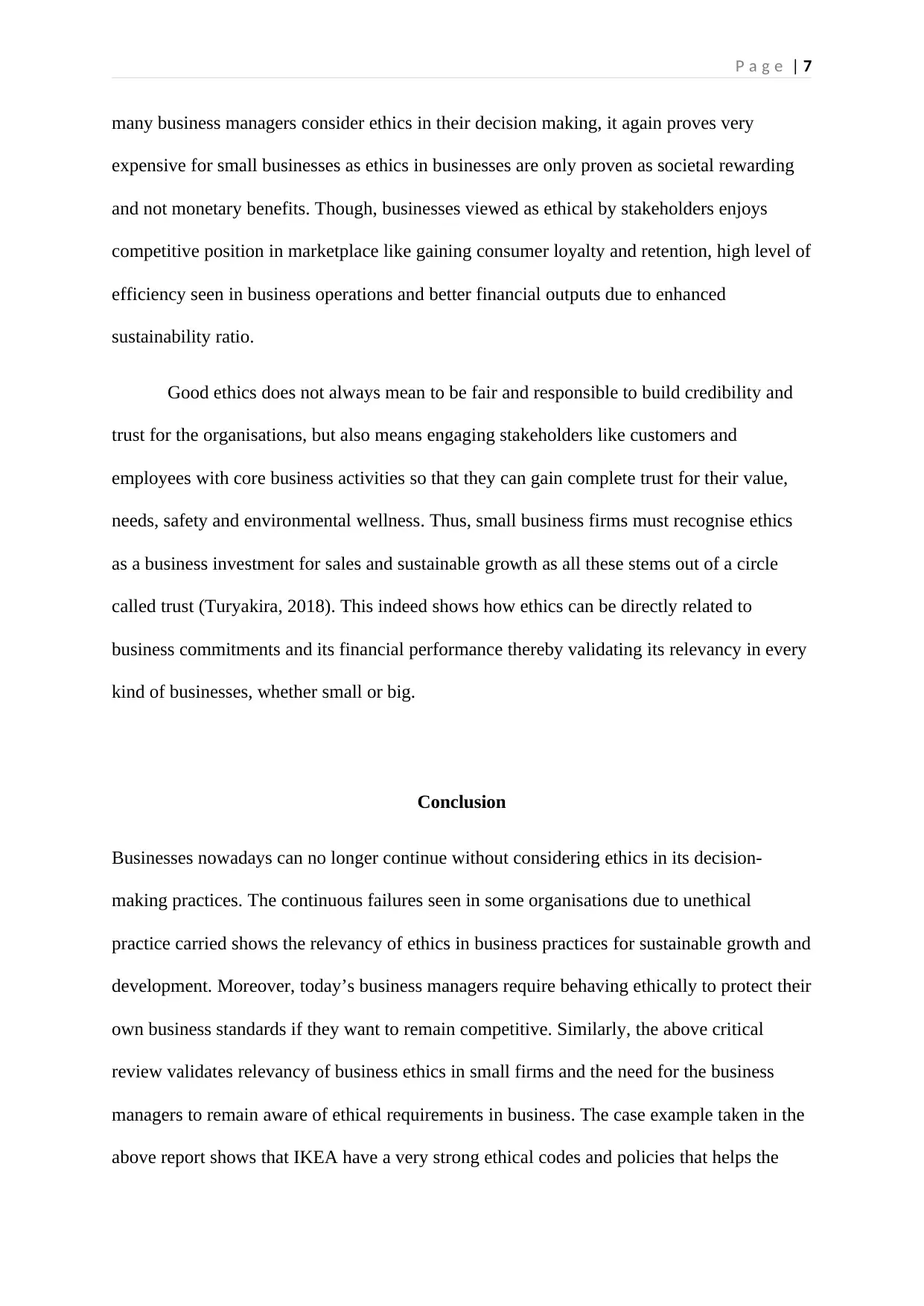
P a g e | 7
many business managers consider ethics in their decision making, it again proves very
expensive for small businesses as ethics in businesses are only proven as societal rewarding
and not monetary benefits. Though, businesses viewed as ethical by stakeholders enjoys
competitive position in marketplace like gaining consumer loyalty and retention, high level of
efficiency seen in business operations and better financial outputs due to enhanced
sustainability ratio.
Good ethics does not always mean to be fair and responsible to build credibility and
trust for the organisations, but also means engaging stakeholders like customers and
employees with core business activities so that they can gain complete trust for their value,
needs, safety and environmental wellness. Thus, small business firms must recognise ethics
as a business investment for sales and sustainable growth as all these stems out of a circle
called trust (Turyakira, 2018). This indeed shows how ethics can be directly related to
business commitments and its financial performance thereby validating its relevancy in every
kind of businesses, whether small or big.
Conclusion
Businesses nowadays can no longer continue without considering ethics in its decision-
making practices. The continuous failures seen in some organisations due to unethical
practice carried shows the relevancy of ethics in business practices for sustainable growth and
development. Moreover, today’s business managers require behaving ethically to protect their
own business standards if they want to remain competitive. Similarly, the above critical
review validates relevancy of business ethics in small firms and the need for the business
managers to remain aware of ethical requirements in business. The case example taken in the
above report shows that IKEA have a very strong ethical codes and policies that helps the
many business managers consider ethics in their decision making, it again proves very
expensive for small businesses as ethics in businesses are only proven as societal rewarding
and not monetary benefits. Though, businesses viewed as ethical by stakeholders enjoys
competitive position in marketplace like gaining consumer loyalty and retention, high level of
efficiency seen in business operations and better financial outputs due to enhanced
sustainability ratio.
Good ethics does not always mean to be fair and responsible to build credibility and
trust for the organisations, but also means engaging stakeholders like customers and
employees with core business activities so that they can gain complete trust for their value,
needs, safety and environmental wellness. Thus, small business firms must recognise ethics
as a business investment for sales and sustainable growth as all these stems out of a circle
called trust (Turyakira, 2018). This indeed shows how ethics can be directly related to
business commitments and its financial performance thereby validating its relevancy in every
kind of businesses, whether small or big.
Conclusion
Businesses nowadays can no longer continue without considering ethics in its decision-
making practices. The continuous failures seen in some organisations due to unethical
practice carried shows the relevancy of ethics in business practices for sustainable growth and
development. Moreover, today’s business managers require behaving ethically to protect their
own business standards if they want to remain competitive. Similarly, the above critical
review validates relevancy of business ethics in small firms and the need for the business
managers to remain aware of ethical requirements in business. The case example taken in the
above report shows that IKEA have a very strong ethical codes and policies that helps the
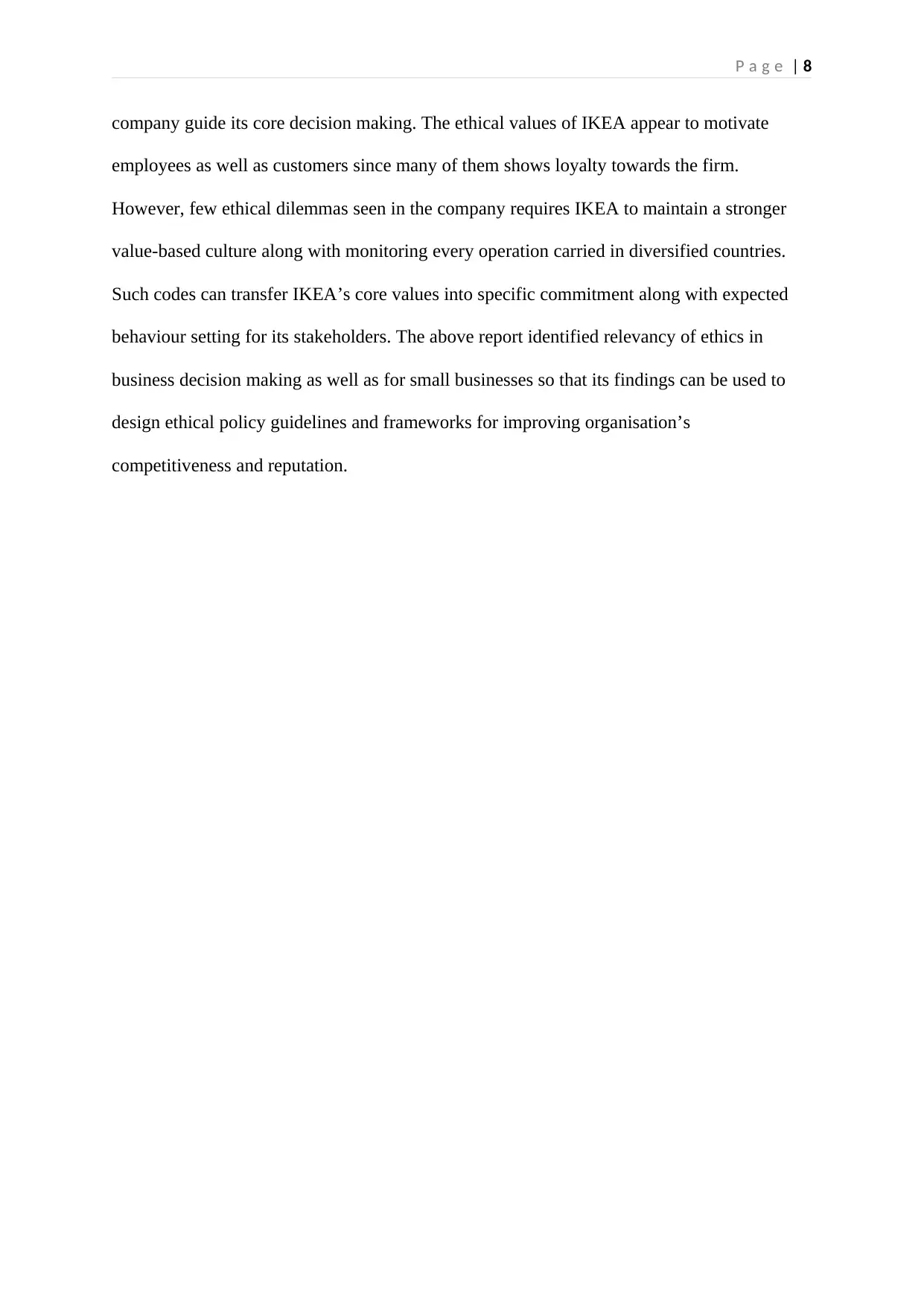
P a g e | 8
company guide its core decision making. The ethical values of IKEA appear to motivate
employees as well as customers since many of them shows loyalty towards the firm.
However, few ethical dilemmas seen in the company requires IKEA to maintain a stronger
value-based culture along with monitoring every operation carried in diversified countries.
Such codes can transfer IKEA’s core values into specific commitment along with expected
behaviour setting for its stakeholders. The above report identified relevancy of ethics in
business decision making as well as for small businesses so that its findings can be used to
design ethical policy guidelines and frameworks for improving organisation’s
competitiveness and reputation.
company guide its core decision making. The ethical values of IKEA appear to motivate
employees as well as customers since many of them shows loyalty towards the firm.
However, few ethical dilemmas seen in the company requires IKEA to maintain a stronger
value-based culture along with monitoring every operation carried in diversified countries.
Such codes can transfer IKEA’s core values into specific commitment along with expected
behaviour setting for its stakeholders. The above report identified relevancy of ethics in
business decision making as well as for small businesses so that its findings can be used to
design ethical policy guidelines and frameworks for improving organisation’s
competitiveness and reputation.
⊘ This is a preview!⊘
Do you want full access?
Subscribe today to unlock all pages.

Trusted by 1+ million students worldwide
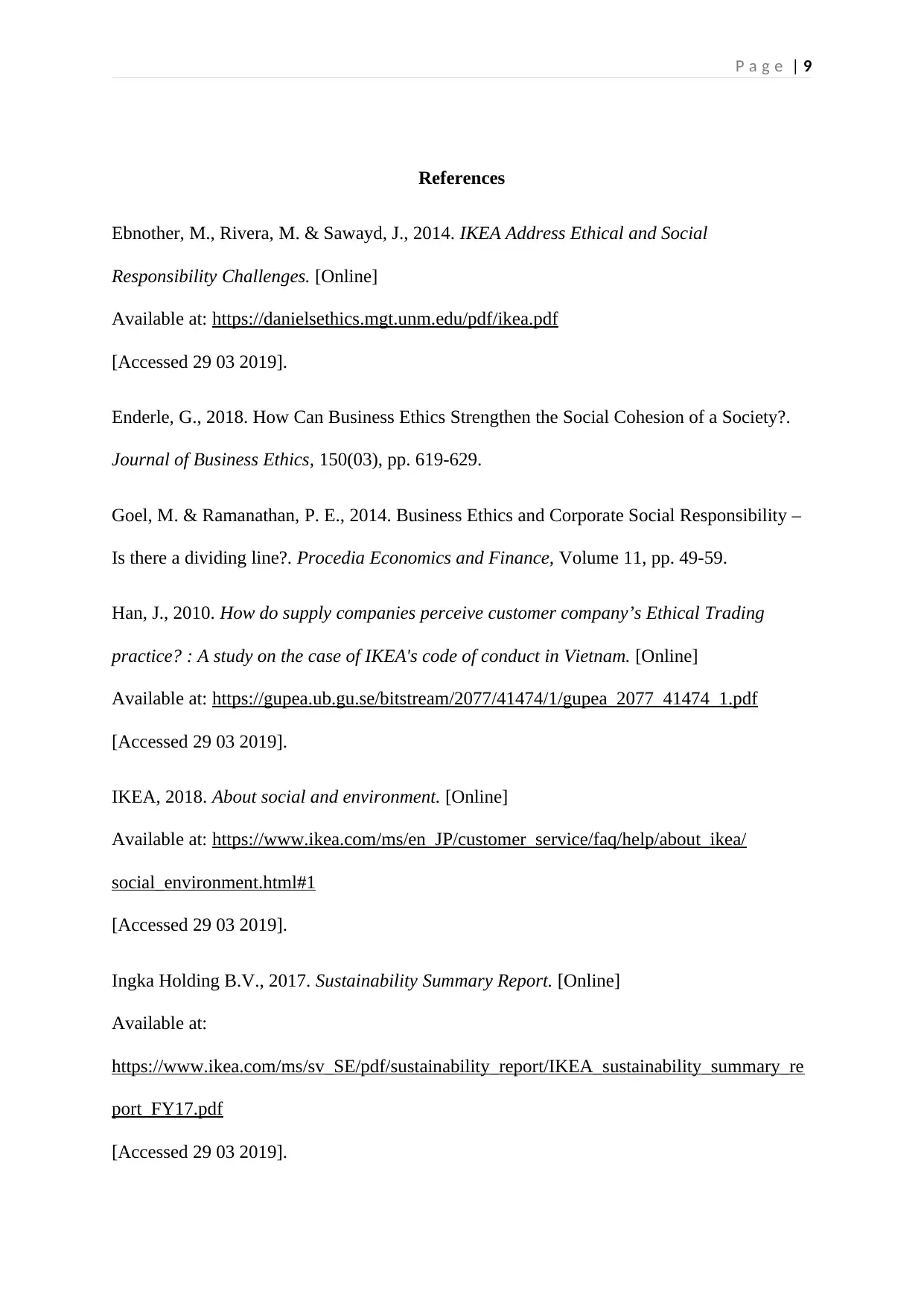
P a g e | 9
References
Ebnother, M., Rivera, M. & Sawayd, J., 2014. IKEA Address Ethical and Social
Responsibility Challenges. [Online]
Available at: https://danielsethics.mgt.unm.edu/pdf/ikea.pdf
[Accessed 29 03 2019].
Enderle, G., 2018. How Can Business Ethics Strengthen the Social Cohesion of a Society?.
Journal of Business Ethics, 150(03), pp. 619-629.
Goel, M. & Ramanathan, P. E., 2014. Business Ethics and Corporate Social Responsibility –
Is there a dividing line?. Procedia Economics and Finance, Volume 11, pp. 49-59.
Han, J., 2010. How do supply companies perceive customer company’s Ethical Trading
practice? : A study on the case of IKEA's code of conduct in Vietnam. [Online]
Available at: https://gupea.ub.gu.se/bitstream/2077/41474/1/gupea_2077_41474_1.pdf
[Accessed 29 03 2019].
IKEA, 2018. About social and environment. [Online]
Available at: https://www.ikea.com/ms/en_JP/customer_service/faq/help/about_ikea/
social_environment.html#1
[Accessed 29 03 2019].
Ingka Holding B.V., 2017. Sustainability Summary Report. [Online]
Available at:
https://www.ikea.com/ms/sv_SE/pdf/sustainability_report/IKEA_sustainability_summary_re
port_FY17.pdf
[Accessed 29 03 2019].
References
Ebnother, M., Rivera, M. & Sawayd, J., 2014. IKEA Address Ethical and Social
Responsibility Challenges. [Online]
Available at: https://danielsethics.mgt.unm.edu/pdf/ikea.pdf
[Accessed 29 03 2019].
Enderle, G., 2018. How Can Business Ethics Strengthen the Social Cohesion of a Society?.
Journal of Business Ethics, 150(03), pp. 619-629.
Goel, M. & Ramanathan, P. E., 2014. Business Ethics and Corporate Social Responsibility –
Is there a dividing line?. Procedia Economics and Finance, Volume 11, pp. 49-59.
Han, J., 2010. How do supply companies perceive customer company’s Ethical Trading
practice? : A study on the case of IKEA's code of conduct in Vietnam. [Online]
Available at: https://gupea.ub.gu.se/bitstream/2077/41474/1/gupea_2077_41474_1.pdf
[Accessed 29 03 2019].
IKEA, 2018. About social and environment. [Online]
Available at: https://www.ikea.com/ms/en_JP/customer_service/faq/help/about_ikea/
social_environment.html#1
[Accessed 29 03 2019].
Ingka Holding B.V., 2017. Sustainability Summary Report. [Online]
Available at:
https://www.ikea.com/ms/sv_SE/pdf/sustainability_report/IKEA_sustainability_summary_re
port_FY17.pdf
[Accessed 29 03 2019].
Paraphrase This Document
Need a fresh take? Get an instant paraphrase of this document with our AI Paraphraser
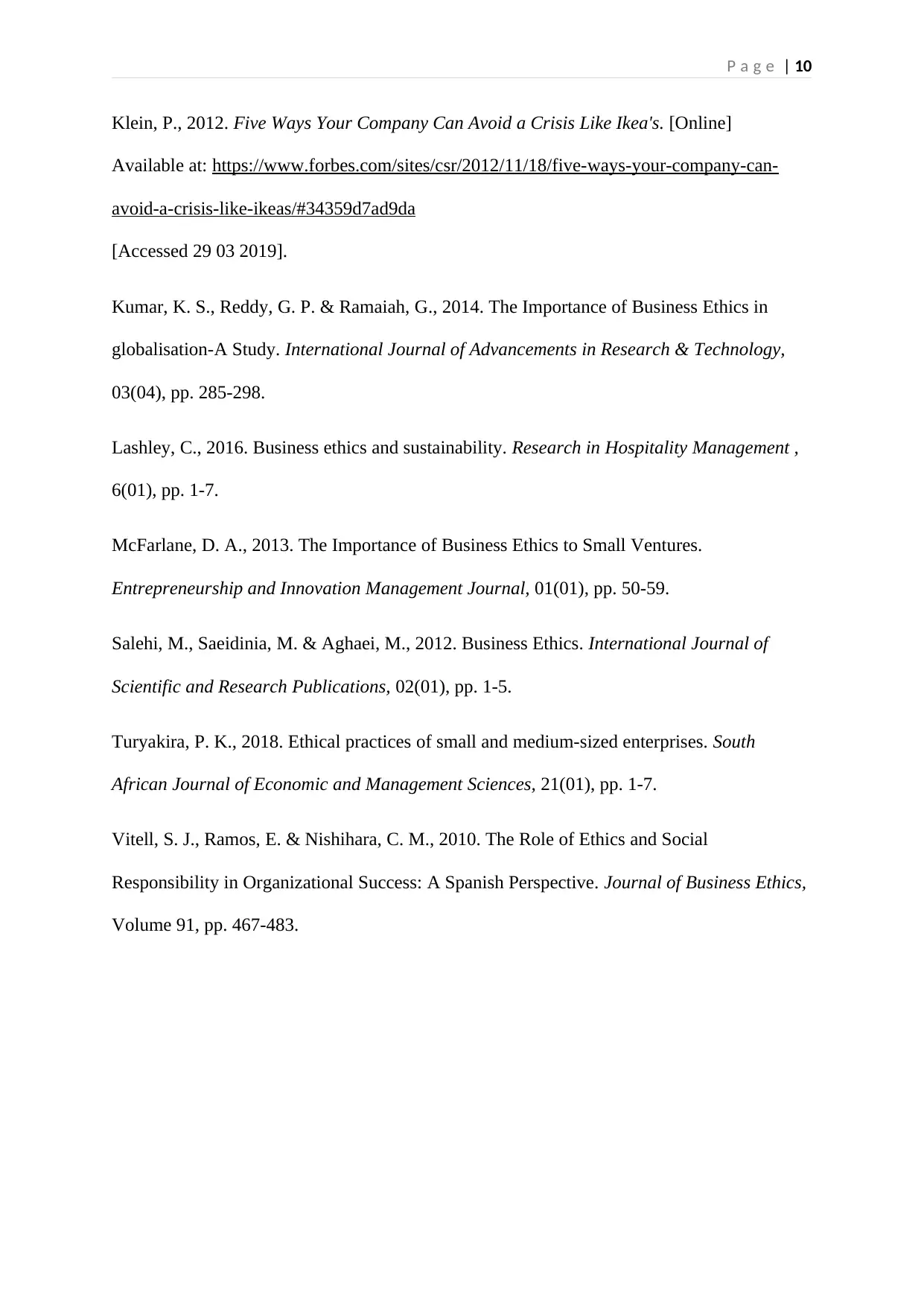
P a g e | 10
Klein, P., 2012. Five Ways Your Company Can Avoid a Crisis Like Ikea's. [Online]
Available at: https://www.forbes.com/sites/csr/2012/11/18/five-ways-your-company-can-
avoid-a-crisis-like-ikeas/#34359d7ad9da
[Accessed 29 03 2019].
Kumar, K. S., Reddy, G. P. & Ramaiah, G., 2014. The Importance of Business Ethics in
globalisation-A Study. International Journal of Advancements in Research & Technology,
03(04), pp. 285-298.
Lashley, C., 2016. Business ethics and sustainability. Research in Hospitality Management ,
6(01), pp. 1-7.
McFarlane, D. A., 2013. The Importance of Business Ethics to Small Ventures.
Entrepreneurship and Innovation Management Journal, 01(01), pp. 50-59.
Salehi, M., Saeidinia, M. & Aghaei, M., 2012. Business Ethics. International Journal of
Scientific and Research Publications, 02(01), pp. 1-5.
Turyakira, P. K., 2018. Ethical practices of small and medium-sized enterprises. South
African Journal of Economic and Management Sciences, 21(01), pp. 1-7.
Vitell, S. J., Ramos, E. & Nishihara, C. M., 2010. The Role of Ethics and Social
Responsibility in Organizational Success: A Spanish Perspective. Journal of Business Ethics,
Volume 91, pp. 467-483.
Klein, P., 2012. Five Ways Your Company Can Avoid a Crisis Like Ikea's. [Online]
Available at: https://www.forbes.com/sites/csr/2012/11/18/five-ways-your-company-can-
avoid-a-crisis-like-ikeas/#34359d7ad9da
[Accessed 29 03 2019].
Kumar, K. S., Reddy, G. P. & Ramaiah, G., 2014. The Importance of Business Ethics in
globalisation-A Study. International Journal of Advancements in Research & Technology,
03(04), pp. 285-298.
Lashley, C., 2016. Business ethics and sustainability. Research in Hospitality Management ,
6(01), pp. 1-7.
McFarlane, D. A., 2013. The Importance of Business Ethics to Small Ventures.
Entrepreneurship and Innovation Management Journal, 01(01), pp. 50-59.
Salehi, M., Saeidinia, M. & Aghaei, M., 2012. Business Ethics. International Journal of
Scientific and Research Publications, 02(01), pp. 1-5.
Turyakira, P. K., 2018. Ethical practices of small and medium-sized enterprises. South
African Journal of Economic and Management Sciences, 21(01), pp. 1-7.
Vitell, S. J., Ramos, E. & Nishihara, C. M., 2010. The Role of Ethics and Social
Responsibility in Organizational Success: A Spanish Perspective. Journal of Business Ethics,
Volume 91, pp. 467-483.
1 out of 11
Related Documents
Your All-in-One AI-Powered Toolkit for Academic Success.
+13062052269
info@desklib.com
Available 24*7 on WhatsApp / Email
![[object Object]](/_next/static/media/star-bottom.7253800d.svg)
Unlock your academic potential
Copyright © 2020–2026 A2Z Services. All Rights Reserved. Developed and managed by ZUCOL.




